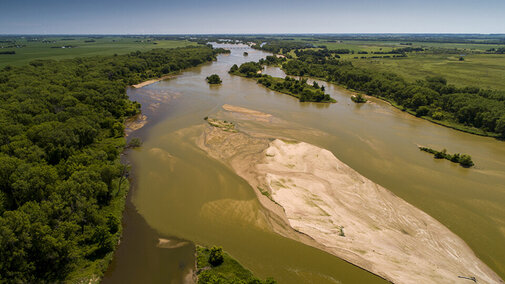Registration is open for the 2023 Water for Food Global Conference, organized by the Daugherty Water for Food Global Institute at the University of Nebraska.
The conference, scheduled for Monday, May 8 to Thursday, May 11, at Nebraska Innovation Campus in Lincoln, will focus on innovative ways to improve water and food security by increasing farmers’ resiliency to a changing landscape. A discount of $100 is available to those who register on or before March 13. Conference details, including how to register, are available here.
The conference, situated in the middle of a living laboratory and atop the vast Great Plains Aquifer, will provide a platform to explore win-win scenarios to support improved water use in agriculture and increase productivity at a variety of scales — from smallholders, collectives and coops to commercial farm operations — while preserving water resources for other human and environmental needs. Additional topic-focused side events, meetings and site tours will round out the conference.
The conference theme is “Cultivating Innovation: Solutions for a Changing World,” focusing on the next generation of research, smart technology, policy development and best practices that are achieving breakthroughs in the vitally important mission of water and food security. Throughout the conference, experts will share research results, case studies and perspectives on how we can achieve global food and water security. Solutions discussed will be sustainable, scalable and adaptable to local contexts, involving all stakeholders in the decision-making process.
Speakers from academia, nonprofit organizations, government agencies and private industry, as well as growers from around the world, will share best practices and advances in science, technology and policy that are helping to achieve greater food security with less pressure on scarce water resources. The conference includes collaborative sessions developed with key partners of the Daugherty Water for Food Global Institute, including the International Water Management Institute, The World Bank, the Food and Agriculture Organization of the United Nations, the National Drought Mitigation Center, the United States Department of Agriculture, the International Food Policy Research Institute, the Environmental Defense Fund, the Nature Conservancy and the World Wildlife Fund, among others.
In addition to the rich variety of sessions, there will be special events to facilitate networking among participants, including two evening receptions; tours of the Water Sciences Lab and the Greenhouse Innovation Center; optional site tours of a University of Nebraska research center, a working farm and a feedlot; and a student poster competition.
Session topics include:
- Scaling smallholder irrigation and supporting entrepreneurs in small-scale agriculture.
- Western rivers, a changing climate and the role of irrigated agriculture.
- The impacts of drought and water-related health issues on human health.
- Sustainable crop intensification.
- New techniques for irrigation water management.
- Smallholder irrigation investments.
- Gender diverse institutions for water security.
- Making the business case for climate-resilient WASH for the food and beverage sector.
- Transitioning from a linear to a circular bioeconomy.
- Resilient and sustainable agri-food systems.
- Addressing water scarcity in agriculture and the environment through partnerships and innovation.
- A view from the field – how farmers from different parts of the world are using technology and best practices to increase yields.
A full list of sessions can be found here.
Speakers include:
- Louise Mabulo, chef, farmer, entrepreneur and founder of The Cacao Project, which cultivates resilient and climate-smart livelihoods, positioning farmers for sustainable success in the Philippines. Mabulo is a National Geographic Young Explorer, a featured honoree for Forbes Asia’s list 30 Under 30, a Young Champion of the Earth under United Nations Environment Program, and a member of the UN Women 30 for 2030 Network.
- Felicia Marcus, attorney and consultant, Water Policy Group; Landreth Visiting Fellow, Stanford’s Water in the West Program; DWFI board member.
- Ted Carter, president, University of Nebraska system.
- John Berge, state executive director, USDA Farm Service Agency.
- Mike Boehm, vice chancellor of agriculture and natural resources, University of Nebraska–Lincoln.
- Mark Svoboda, director and climatologist, National Drought Mitigation Center.
- Rachael McDonnell, deputy director general — research for development, International Water Management Institute.
More speakers to be added as they are confirmed found here.
Discounted registration is available for University of Nebraska faculty, staff and students is available here.
Early general public registration runs through March 13 and is $400. Regular registration runs to April 28, and is $500.
The 2023 Water for Food Global Conference is a regional event for the 10th World Water Forum, the world’s largest water-related forum organized by the World Water Council.

